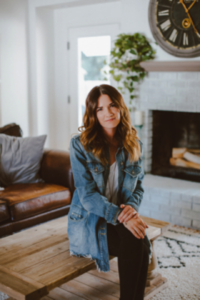I don’t have all of the answers, and I will never fully understand why God allowed Andrew to die at thirty years old the way he did, but I still have hope. I can pin my hope in God because I know if I lose hope, I lose everything. Life without hope is life without meaning. That first week after Andrew died is still a complete blur. The decisions I made were too many to count, the emotions too overwhelming to describe, and the gut-wrenching pain too deep to comprehend. But I still had hope. In my soul I knew God was still there, sitting right beside me, weeping with me, holding me through every moment of my pain. My mind was lost and confused, but in the center of the confusion, there was hope.
Hope beyond my circumstance. Hope in my future. Hope in heaven. In the dark moments and days following Andrew’s death, there was a delicate dance between hope and fear. The seed of hope was rooted deep within my soul but fear had run its course and destroyed my life. Fear had crept into our home and spread like wildfire. It had been fear gone wild, wild enough to take over everything.
was a delicate dance between hope and fear. The seed of hope was rooted deep within my soul but fear had run its course and destroyed my life. Fear had crept into our home and spread like wildfire. It had been fear gone wild, wild enough to take over everything.
The anxiety was rooted in fear.
The panic attacks were rooted in fear.
The depression was rooted in fear.
The spiritual warfare was rooted in fear.
And ultimately the suicide was rooted in fear.
Although we would like to live without it, we actually need fear. Fear protects us and stops us from making bad decisions. Fear tells us when something isn’t right. Without fear, our lives would be filled with even more problems and pain. From the moment we are born we learn to fear certain things in this world in order to survive. Fear is part of being human.
We need fear to survive, but we also need hope—just enough fear to keep us grounded and just enough hope to keep us looking up. But how do we know which one is running the show? How do we know when fear has taken over and is running wild?
A FEW SIGNS FEAR MAY BE RULING OUR LIVES:
We settle for less.
Fear can cause us to shrink back from our dreams and aspirations. Fear is the tiny voice that whispers, “You could never do that. You aren’t smart enough. You aren’t talented enough. You aren’t qualified enough. It will take too long. It won’t happen for you.” If we feel like we are settling for less, we can decide today to fight for more. We can stop allowing fear to control our dreams, and we can start to believe we are capable, we are smart, and we can do anything because with God, anything is possible.
We say yes when we want to say no.
Fear of letting people down can cause us to respond with a quick yes when it would be best to say no. We can’t be everything to everyone all the time. When we try to be, we will become bitter, and resentment will build up in our hearts. The next time we feel the urge to say yes even though we want to say no, we can stop and ask ourselves, “What is motivating my response?” If the answer is fear, we can take control and decide to say no.
We seek to numb the pain.
Fear can cause deep inner pain, which can make us physically ill. Fear can manifest itself in anger, sadness, loneliness, and fatigue. We sometimes try to avoid the pain with temporary Band-Aids like alcohol, drugs, food, sex, work, television, or social media. Before we reach for empty relief, we can choose instead to pick up the phone and call a friend, get down on our knees and say a prayer, pull out a journal and write our thoughts, or turn off all of the noise and sit in solitude. When we create and seek healthy outlets for our pain, we minimize fear and create space for hope.
We want control.
Fear may cause us to feel the need to control everything and everyone around us. Especially when the fear is birthed from a place of trauma. We may believe that by having control we can actually prevent the bad, awful thing from happening again. To let go of control we must replace fear with faith. Faith that God keeps his promises and he will truly work everything together for our good.
We get sick.
Living under constant fear comes at a high cost. Fear can weaken the immune system, causing heart damage or intestinal problems such as irritable bowel syndrome and ulcers. Fear can decrease fertility, cause us to age at a faster rate, and even lead to premature death. Fear also has a powerful impact on the mind. Over a period of time fear can impair memory, cause brain damage, and even
change the way our brains process information, which can cause us to make poor decisions, react irrationally, and respond negatively to the world around us. Long-term fear can lead to mental health complications such as clinical depression, fatigue, and PTSD.
We can choose to believe, no matter how dark our circumstances, we serve a God who always has one more move.
When the test results come in and it’s not good, God still has one more move.
When the job falls through again and again, God still has one more move.
When it feels like everyone has abandoned us and we are all alone, God still has one more move.
When the pain is overwhelming and we want to give up completely, God still has one more move.
When suicide strikes and we feel like our lives are over too, God still has one more move.
The secret to conquering fear and death is safely securing our hope in him who always has one more move.
Kayla Stoecklein is an advocate for those confronting mental illness having lost her husband to suicide two years ago. When she isn’t busy raising her three young boys, you can find her on the beach, sipping an iced coffee and searching for little glimpses of heaven on earth. Join her at www.kaylastoecklein.com and on Instagram @kaylasteck. Fear Gone Wild, available nationwide September 8, 2020, is her first book.






